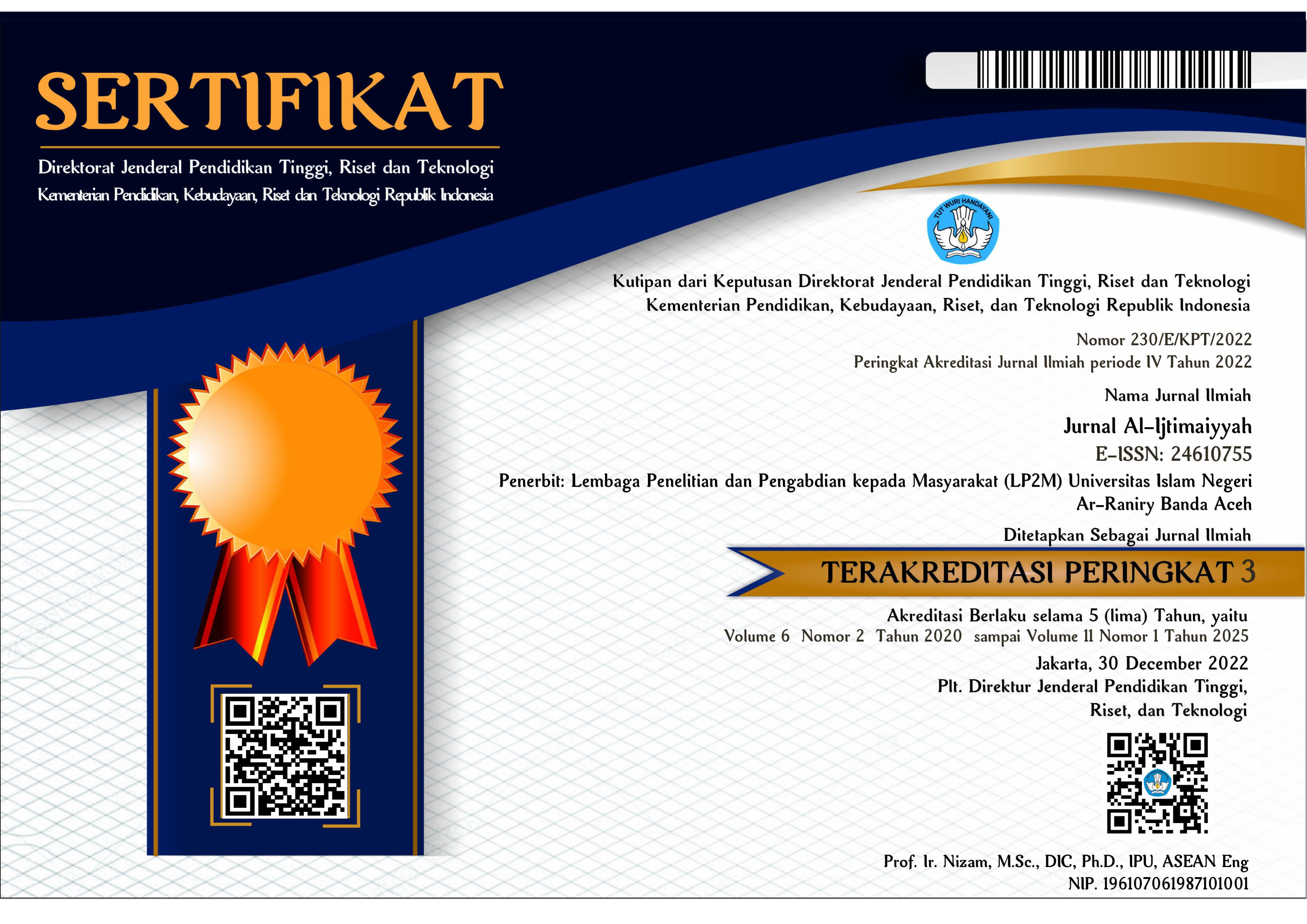THE IMPACT OF DIVORCE OUTSIDE THE RELIGIOUS COURT ON THE SOCIAL LIFE OF THE COMMUNITIES IN ACEH UTARA AND ACEH BARAT
DOI:
https://doi.org/10.22373/al-ijtimaiyyah.v10i1.23859Keywords:
Divorce, Religious Courts, Social Life of the CommunityAbstract
Divorce is a final path that must be taken in resolving household disputes and turmoil. If the cracks in the household can no longer be reconciled, it is feared that it will cause division between the two families. The objectives of this study are to understand the law of divorce in religious courts and outside of them, the factors causing divorce outside the religious courts, and to identify the impacts of divorce outside the religious court on the social life of the communities in Aceh Utara and Aceh Barat. This research uses a qualitative method, where the researcher thoroughly examines the facts found in the research locations according to the problem focus directly, then presents and discusses the analysis results. To obtain accurate and reliable data, data collection was carried out through observation, interviews, and documentation. The results show: (1) in Islamic law, divorce performed outside the religious court is valid, while the law of divorce outside the religious court is not valid under Indonesian law and the Marriage Law as well as the Compilation of Islamic Law; (2) the factors causing the community to divorce outside the religious court are due to adhering to the opinions of the Imam Mazhab and local ulama, due to customs, economic conditions, ignorance/lack of understanding of regulations, laziness in processing, and indifference to divorce laws; and (3) the impacts felt by the community after divorcing outside the religious court are not receiving the iddah rights, difficulty in remarrying. After all, they do not have a divorce certificate, as the KUA does not permit because they are still considered the wife of the first husband. Furthermore, they cannot claim joint property, hadhonah, and child support. This is consistent with what has happened to the people of Aceh Utara and Aceh Barat. Additionally, problems arising from divorce outside the religious court are related to children and their education, lack of legal certainty, asset distribution, inheritance, creating priority for the husband over the wife, the husband being arbitrary towards the wife, and child custody.
Downloads
References
Abdurrahman. 1986. Himpunan Peraturan Perundang-undangan tentang Perkawinan [Compilation of Legislation on Marriage]. Jakarta: Akademi Persindo.
Ghazaliy, Abdul Rahman. 2007. Fiqh Munakahat [Jurisprudence of Marriage]. Jakarta: Kencana.
Hamdani, Al. 1985. Risalah Nikah [Treatise on Marriage]. Jakarta: Pustaka Amani.
Mugniyah, Jawad Muhammad. 2007. Fiqih Lima Mazhab [Jurisprudence of the Five Schools of Thought]. Jakarta: Lentera.
Nur, Djamaan. 1993. Fiqih Munaqahat [Jurisprudence of Marriage]. Semarang: CV. Toha Putra.
Sabiq, Sayyid. 2009. Fiqh Sunnah [Sunnah Jurisprudence]. Bandung: Al-Ma`arif.
Salim, As-Sayyid, bin Kamal bin Abu Malik. 2007. Shahih Fiqih Sunnah [Authentic Sunnah Jurisprudence], Jilid 3. Jakarta: Pustaka Azzam.
Soemiyati. 2004. Hukum Perkawinan Islam dan Undang-Undang Perkawinan [Islamic Marriage Law and Marriage Law]. Yogyakarta: Liberty.
Taqiyuddin. 2005. Kifayatul Akhyar [Sufficiency of the Good], Juz II. Bandung: Al-Haromain Jaya.
Downloads
Published
Issue
Section
License
Copyright (c) 2024 Zulfadli, Muchlis Aziz

This work is licensed under a Creative Commons Attribution-ShareAlike 4.0 International License.
Authors who publish in Jurnal Al-Ijtimaiyyah agree to the following terms:
- Authors retain copyright and grant the journal right of first publication with the work simultaneously licensed Attribution-ShareAlike 4.0 International (CC BY-SA 4.0) that allows others to share the work with an acknowledgment of the work's authorship and initial publication in this journal.
- Authors are able to enter into separate, additional contractual arrangements for the non-exclusive distribution of the journal's published version of the work (e.g., post it to an institutional repository or publish it in a book), with an acknowledgment of its initial publication in this journal.
- Authors are permitted and encouraged to post their work online (e.g., in institutional repositories or on their website) prior to and during the submission process, as it can lead to productive exchanges, as well as earlier and greater citation of published work. (See The Effect of Open Acces)









